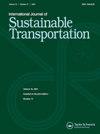组织环境伦理和生态创新对绿色港口绩效影响的决定因素:供应商参与的调节作用
IF 3.9
3区 工程技术
Q2 ENVIRONMENTAL STUDIES
International Journal of Sustainable Transportation
Pub Date : 2025-07-03
DOI:10.1080/15568318.2025.2522994
引用次数: 0
摘要
组织环境伦理和创新在塑造绿色港口绩效方面变得越来越重要。虽然先前的研究考察了影响这一绩效的因素,但对环境伦理、生态创新、流程创新和供应商参与之间的相互作用的关注有限。环境伦理推动可持续实践,而生态创新和流程创新引入先进技术和操作流程,以减轻对环境的影响。此外,供应商的参与在合作的可持续性努力中起着至关重要的作用。本研究探讨了这些因素的综合影响,为提高绿色港口绩效和推进可持续港口管理实践提供了有价值的见解。我们使用了从181个集装箱码头工人样本中收集的数据。采用结构方程模型(SEM)和层次回归方法对数据进行分析。研究发现,环境伦理和生态创新对流程创新有显著影响,绿色港口绩效受流程创新和供应商参与的正向影响。此外,供应商参与对流程创新与绿色港口绩效之间的关系具有正向调节作用。本文提出了关于供应商参与的新知识的实际含义,从业者可以利用这些知识来利用港口运营并提高绿色港口绩效。本研究还提供了关于环境伦理、生态创新、流程创新和供应商参与如何有助于绿色港口绩效的理论启示,这还有待于对港口行业进行理论或实证检验。本文章由计算机程序翻译,如有差异,请以英文原文为准。
Determinants of the impact of organizational environmental ethics and eco-innovation on green port performance: The moderating role of supplier involvement
Organizational environmental ethics and innovation are becoming increasingly critical in shaping green port performance. While prior research has examined the factors influencing this performance, limited attention has been given to the interaction between environmental ethics, eco-innovation, process innovation, and supplier involvement. Environmental ethics drives sustainable practices, while eco-innovation and process innovation introduce advanced technologies and operational processes to mitigate environmental impacts. Additionally, supplier involvement plays a vital role in collaborative sustainability efforts. This study explores the combined influence of these elements, offering valuable insights for enhancing green port performance and advancing sustainable port management practices. We used data collected from a sample of 181 container terminal workers. Structural equation modeling (SEM) and hierarchical regression methods were used for the data analysis. The findings indicated that both environmental ethics and eco-innovation significantly influenced process innovation and that green port performance was positively affected by process innovation and supplier involvement. Additionally, supplier involvement had a positive moderating impact on the relationship between process innovation and green port performance. This paper advances the practical implications of new knowledge regarding supplier involvement, which practitioners can use to capitalize on port operations and improve green port performance. This study also contributes theoretical implications in terms of how environmental ethics, eco-innovation, process innovation, and supplier involvement can assist green port performance, which has yet to be theorized or empirically examined for the port industry.
求助全文
通过发布文献求助,成功后即可免费获取论文全文。
去求助
来源期刊
CiteScore
8.90
自引率
2.60%
发文量
56
期刊介绍:
The International Journal of Sustainable Transportation provides a discussion forum for the exchange of new and innovative ideas on sustainable transportation research in the context of environmental, economical, social, and engineering aspects, as well as current and future interactions of transportation systems and other urban subsystems. The scope includes the examination of overall sustainability of any transportation system, including its infrastructure, vehicle, operation, and maintenance; the integration of social science disciplines, engineering, and information technology with transportation; the understanding of the comparative aspects of different transportation systems from a global perspective; qualitative and quantitative transportation studies; and case studies, surveys, and expository papers in an international or local context. Equal emphasis is placed on the problems of sustainable transportation that are associated with passenger and freight transportation modes in both industrialized and non-industrialized areas. All submitted manuscripts are subject to initial evaluation by the Editors and, if found suitable for further consideration, to peer review by independent, anonymous expert reviewers. All peer review is single-blind. Submissions are made online via ScholarOne Manuscripts.

 求助内容:
求助内容: 应助结果提醒方式:
应助结果提醒方式:


